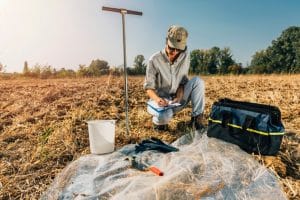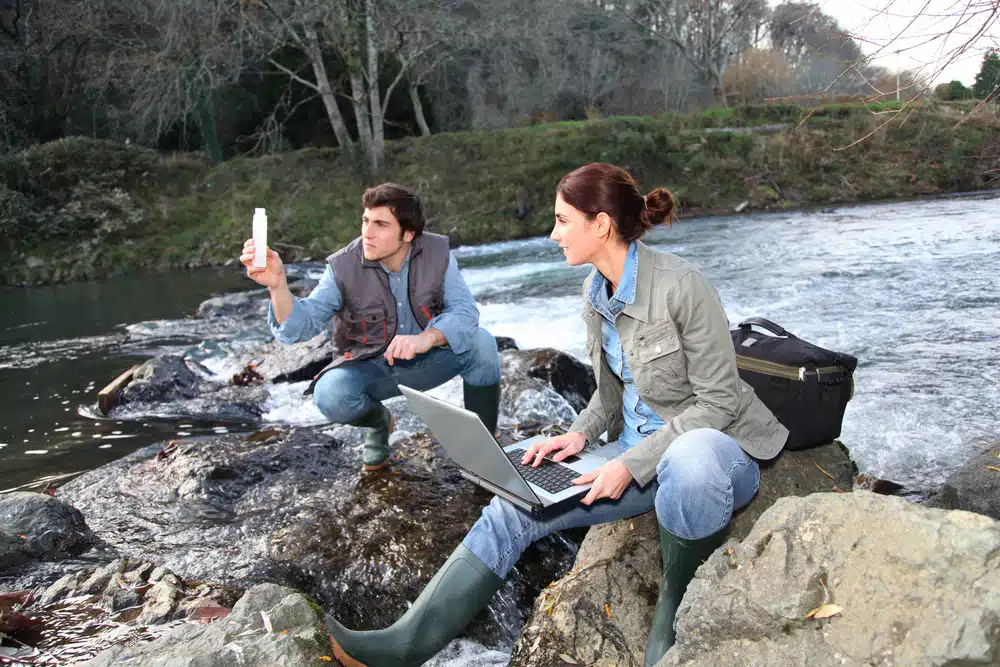Discovering the Best Schools for Environmental Science
The field of environmental science is growing. This growth is due to an increased recognition of the importance of understanding and protecting our environment. As a result, more and more students are choosing to study this field. However, not all schools are equal, and finding the best school for environmental science can be a complex task. In this article, we will guide you through this process.
Understanding Environmental Science as a Field of Study
Before we delve into the best schools, let’s first understand what studying environmental science entails. Environmental Science is a multidisciplinary academic field that integrates various scientific disciplines, including biology, geology, chemistry, and physics, to study the environment and solve environmental problems.

When studying environmental science, students gain a deep understanding of the intricate relationships between living organisms and their environment. They learn how ecosystems function, how human activities impact the environment, and how to develop sustainable solutions to mitigate these impacts.
One of the key aspects of environmental science is the study of ecology. Ecologists investigate the interactions between organisms and their environment, studying population dynamics, food webs, and energy flow through ecosystems. By understanding these complex relationships, environmental scientists can better assess ecosystems’ health and develop conservation strategies.
The Importance of Environmental Science
Environmental science is crucial as it provides a comprehensive understanding of our natural world and how we can best preserve it. Environmental scientists play a crucial role in safeguarding the planet’s future, contributing to solutions for pressing issues like climate change, natural resource depletion, and biodiversity loss.
Climate change, in particular, is one of the most urgent challenges facing our planet. Environmental scientists study the causes and impacts of climate change and potential mitigation and adaptation strategies. Through their research and advocacy, they strive to raise awareness and promote sustainable practices that can help mitigate the effects of climate change.
In addition to climate change, environmental scientists also tackle issues related to natural resource depletion. With the growing global population and increasing demands for resources, it is essential to find sustainable ways to manage and conserve resources such as water, forests, and minerals. Environmental science provides the knowledge and tools to develop sustainable resource management practices.
Key Disciplines within Environmental Science
Environmental Science encompasses various disciplines. This includes but is not limited to ecology, conservation biology, environmental policy, and earth science. Specialists in these fields collaborate to find and implement solutions to environmental problems.
Conservation biology is a discipline within environmental science that focuses on preserving and restoring biodiversity. Conservation biologists study the threats to species and ecosystems, develop strategies for their protection, and work towards the sustainable management of natural resources.
Environmental policy is another important discipline within environmental science. Environmental experts analyze existing policies and propose new ones to address environmental challenges. They work with governments, organizations, and communities to develop regulations and guidelines that promote sustainable practices and protect the environment.

Earth science, also known as geoscience, is another key discipline within environmental science. Earth scientists study the physical processes that shape the Earth, such as plate tectonics, erosion, and climate patterns. By understanding these processes, environmental scientists can better predict and mitigate natural hazards like earthquakes, volcanic eruptions, and severe weather events.
Overall, environmental science is a dynamic and interdisciplinary field that plays a crucial role in understanding and addressing the environmental challenges we face today. By studying environmental science, students gain the knowledge and skills necessary to impact the planet and contribute to a sustainable future positively.
Criteria for Evaluating Environmental Science Schools
Before selecting an environmental science school, it is important to consider certain criteria. These factors can range from the school’s reputation to the research opportunities it provides. Making an informed decision will ensure you choose a school that aligns with your academic and career goals.
Accreditation and Reputation
A school’s accreditation status and reputation are crucial considerations. Accreditation ensures that the school’s curriculum meets the stringent standards set by education authorities. Choosing a school accredited by recognized accrediting bodies such as the Accrediting Commission for Schools, Western Association of Schools and Colleges, or other regional accrediting agencies is important. Accreditation ensures that the school meets certain quality standards and that your degree will be recognized by employers and other educational institutions.
Additionally, a good reputation can be indicative of the school’s quality and the value of its degree in the job market. Research the school’s reputation by looking at rankings, reviews, and alumni success stories. A school with a strong reputation often attracts top faculty and offers a supportive learning environment.
Faculty Expertise and Research Opportunities
The faculty’s expertise in relevant fields and the opportunity to participate in cutting-edge research are significant factors for consideration. Studying under experienced and respected professors can greatly enhance a student’s learning experience. Look for schools that have faculty members who are actively engaged in research and have expertise in areas that align with your interests.
Research opportunities provide practical experience and can pave the way for a future career in academia or industry. Look for schools that offer research programs, internships, or cooperative education opportunities. These experiences will allow you to apply your knowledge in real-world settings and build valuable connections in the field.
Course Offerings and Specializations
The diversity and focus of course offerings also matter. A school with a wide range of environmental science courses will allow students to explore various areas and find their niche. Look for schools that offer a variety of courses in areas such as ecology, environmental policy, sustainability, and conservation.
Specializations can offer more in-depth knowledge in a particular area and can be beneficial for career prospects. Consider whether the school offers specializations or concentrations within the environmental science program that align with your interests and career goals. Specializations can provide a focused education and make you stand out in the job market.
Choosing the right environmental science school is an important decision that will shape your academic and professional future. Take the time to thoroughly research and consider the school’s accreditation and reputation, the faculty’s expertise, the research opportunities available, and the diversity of course offerings and specializations. By considering these criteria, you will be well-equipped to make an informed decision and find a school that will provide you with a high-quality education and open doors to exciting career opportunities in the field of environmental science.
Top Schools for Environmental Science in the United States
Studying environmental science at the undergraduate or graduate level can open up a world of opportunities for students passionate about the environment and sustainability. The field encompasses a wide range of disciplines, including ecology, conservation biology, environmental policy, and environmental engineering.
Certain American universities stand out when it comes to offering superior education in environmental science. High-ranking Ivy League schools, as well as some strong public universities, have top-tier programs.
Below are the best schools for environmental science:
University of California, Berkeley
The Environmental Science major at Berkeley is an excellent example of an interdisciplinary degree program. The topics of biology, ecology, chemistry, toxicology, geology, hydrology, meteorology, geography, engineering, statistics, behavioral science, policy analysis, economics, and law are covered in this course. Students can also concentrate on either social sciences, physical sciences, or biological sciences.
The culmination of the program is a research project that lasts for an entire year and is referred to as the senior thesis. During this time, students will examine a problem related to the environment and plan and carry out independent research.
Yale University
A Bachelor of Arts and a Bachelor of Science can be earned in Environmental Studies from Yale University. Students are encouraged to struggle with some of the most difficult environmental issues facing the world today through participation in multidisciplinary programs that investigate themes from the humanities, social sciences, and natural sciences. Students will prepare for the EVST senior essay, which will serve as the capstone project for the major, throughout the course of their studies.
Columbia University
The study of the dynamic relationship that exists between the biosphere and the planet’s physical environment is the focus of Columbia University’s Environmental Science major. Students receive an in-depth education in a variety of key scientific subjects. A senior capstone experience is a requirement of the curriculum. Students will work with a faculty advisor to complete a research project and a senior thesis during this time.
Bucknell University
Environmental Studies and Environmental Science are available as majors at Bucknell, leading to the Bachelor of Arts degree. You will engage in experiential learning no matter which curriculum you select by traveling to nearby waterways, rural communities, and state forests. You will also participate in research directed by faculty members and travel the world to address issues prevalent in the real world, such as environmental preservation in Europe and climate change in Central Asia.
University of California, Los Angeles
Students who earn a bachelor’s degree in environmental science from UCLA participate in a dynamic, all-encompassing learning experience that equips them to address a wide range of challenging environmental concerns.
This experience combines theory, community, and real-world application. The Senior Practicum is a year-long capstone program that students must complete in order to graduate with the degree. During this time, they will collaborate on projects with their fellow students as well as a member of the teaching staff or another environmental specialist.
Brown University
A Bachelor of Arts in Environmental Studies and a Bachelor of Science in Environmental Science are the two undergraduate degrees that can be earned through the Institute at Brown for Environment and Society (IBES).
Both routes, to a degree, provide students with an interdisciplinary education that includes a strong grounding in the scientific and social sciences as well as public administration.
In addition, students will select one of five specialized study paths:
- Air, Climate & Energy
- Conservation Science & Policy
- Environment and Inequality
- Land, Water & Food Security
- Sustainability in Development
Colgate University
The Environmental Studies Program at Colgate University takes a multidisciplinary approach to education by allowing students to major in Environmental Biology, Environmental Economics, Environmental Geography, Environmental Geology, and Environmental Studies, in addition to providing students with the opportunity to minor in Environmental Studies.
Every route offers many choices, some of which include substantial study abroad experiences, such as a semester spent participating in an immersion program at the University of Wollongong, located in New South Wales, Australia. In addition to this, there are several options for research.
University of Pennsylvania
Earth Science (EASC) and Environmental Studies (ENVS) are available as undergraduate majors through Penn’s Department of Earth and Environmental Science. Additionally, the department offers undergraduate minors in Environmental Science, Environmental Studies, Geology, and Sustainability and Environmental Management. Students have a wealth of opportunities to conduct research thanks to initiatives such as the Hayden Scholars Program and communities such as the Penn Geology Society.
Washington University in St. Louis
Students at WashU who are enrolled in the Environmental Studies degree study toward an understanding of the processes that shape the environment of the Earth. Students have the option to major or minor in Environmental Analysis, and there is also a minor in Environmental Studies available to them.
Through coursework and independent study, all the programs train students to address environmental issues occurring in the world. In addition to this, they might take part in learning activities that are project-based, cross-disciplinary, and community-oriented.
University of Southern California
The Environmental, Natural, and Social Sciences (ENVS) degree programs at USC are constructed on a foundation of specific natural and social science classes as well as interdisciplinary classes centered on sustainability. Students working toward receiving a Bachelor of Arts degree can specialize in either science and management or policy and management. Meanwhile, the Bachelor of Science degree offers students the opportunity to specialize in one of four areas: sustainability and society; oceans and people; climate and environment; or environmental policy.
Career Prospects after Graduating from Top Environmental Science Schools
Graduating from any of the top environmental science schools can open many doors in terms of career prospects. With an environmental science degree, graduates can expect various job roles across diverse industries and promising wage prospects.
Environmental scientists can work in an array of industries, including governmental organizations, corporations, nonprofits, or even think tanks. Potential job roles include environmental consultants, conservation scientists, climatologists, and many more.

Career growth and salary expectations vary based on job role and location. However, given the increasing emphasis on sustainability and environmental protection, the demand for environmental science professionals is expected to increase, with growth opportunities and earning potential.
Pursuing an education in environmental science can be rewarding both personally and professionally. Choose the best school for you based on a careful evaluation of the school’s offerings and alignment with your career goals. Remember, the future of our planet could depend on your work!
If you need help putting the finishing touches on your college applications, at AdmissionSight, we have over 10 years of experience guiding students through the competitive admissions process.
AdmissionSight can help you put your best foot forward when applying to college this fall. Contact us today for more information on our services.





































